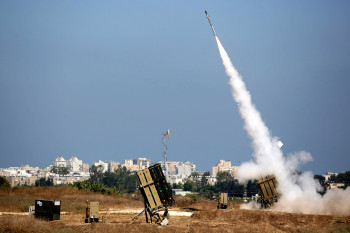IN THE MEDIA
Hamas rockets beg response
July 11, 2014 | Sharyn Mittelman

Sharyn Mittelman
Canberra Times – July 11
With confrontation between Israel and the Hamas in the Gaza Strip escalating, it is important to understand the conflict’s context. Israel is currently under attack, with over 180 rockets fired into its territory from the Gaza Strip in recent days. The rockets have sent Israelis from central Tel Aviv to Jerusalem, from southern Beersheba to northern Hadera, running into bomb shelters. Israeli citizens – including Jews, Muslims, Christians and Druze, have as little as fifteen seconds to run for cover. Imagine waking up in the middle of the night to warning sirens, to grab your children and seek shelter. It is not a situation any county would tolerate. While Israelis have been injured in the rocket attacks, fortunately, to date there have been no fatalities. That is not for lack of trying by Hamas, but rather due to Israel’s expensive investment in Iron Dome – an anti-missile defence system, alarm warnings and bomb-shelters throughout a country that is a third of the size of Tasmania.
Israel did not want another confrontation with Hamas in the Gaza Strip. In fact, following a volley of rockets into Israel, a senior Israeli military official sent a message to Hamas on July 3 stating, “Quiet will be met with quiet”, and “Israel has no interest in an escalation. If Hamas reins in the shooting now, we won’t act, either.” IDF Chief of Staff Benny Gantz also said, “We don’t seek escalation, but our job is to prepare for such possibility.”
Hamas ignored the peace offering, and rocket fire from the Gaza Strip into Israel escalated. In response, on Tuesday morning Israel launched a major operation against Hamas and other terror groups in Gaza, named Operation Protective Edge, and has called up 40,0000 reserve soldiers as it considers a possible ground invasion of Gaza. Again, Israel says it wishes to refrain from a large-scale military operation, but that it will also do everything needed to protect its citizens.
Israel has conducted airstrikes targeted at Hamas and other terrorist groups, however, Hamas intentionally fires rockets and hides weapons in civilian areas. While the Israeli army distributes leaflets to warn civilians of impending airstrikes, tragically civilians in Gaza have been killed in the crossfire. For Israel, every civilian death is a tragedy to be avoided, for Hamas, Israeli civilians are the target of their rocket fire.
Israel withdrew from the Gaza Strip in 2005, removing 8000 Israelis and 20 settlements. Following a bloody coup in 2007 against its political rival Fatah, Hamas took over the Gaza Strip. Hamas is a Sunni Islamist organisation linked to the Muslim Brotherhood and considered to be a terrorist group by Israel, the US, the EU and Canada, among others. Hamas is committed to Israel’s destruction as enshrined in its charter, and it not only encourages rocket attacks into Israel, but has been responsible for terrorist attacks that have killed hundreds of innocent Israeli civilians. Israel also has evidence that Hamas operatives were responsible for the recent kidnap and murder of three Israeli teenagers. While Hamas denied responsibility for their kidnapping, the three suspects are known Hamas operatives in the West Bank, and Hamas also publicly applauded their kidnap and murder.
Today, Hamas is widely disliked amongst the people it purports to represent. A recent Pew Research Center poll found of those surveyed in the Gaza Strip, 63% held negative views of Hamas and that 79% were concerned about Islamist extremism. Regional views of Hamas were also negative in countries including Turkey (80%), Lebanon (65%), Egypt (61%) and Jordan (61%). Some speculate that this latest attack on Israel may be aimed at increasing its popularity and its sources of funding, following reports that Hamas is largely bankrupt. Hamas’ financial woes, and its lost support from Egypt, were also considered reasons why it agreed to a unity government with Fatah in April.
When Israel withdrew from the Gaza Strip in 2005, the area could have flourished – investment and tourism could have boomed. But hostility towards Israel was so strong that when Israel left, local residents smashed the greenhouses the Israelis left behind and the rockets kept flying into Israel. Israel imposed a security blockade on Gaza precisely to stop the flow of weapons into Gaza and rockets into Israel. The UN Palmer report found this blockade to be legal under international law. For example, in March, Israel’s Navy intercepted an Iranian arms ship destined for Gaza, which included 40 Syrian made M302 rockets that have a range of between 90 to 160 kilometres. An M302 rocket was reportedly just recently fired at the Israeli northern city of Hadera from Gaza.
Hamas continues to fire rockets into Israel because that is its raison d’etre. Israel will need to respond to defend its citizens, who cannot possibly be expected to live under rocket attack. The situation may escalate into a ground-force operation that Israel did not wish for. But if it does, it is important to remember that if there were no rockets fired into Israel, there would be no response.
Sharyn Mittelman is a Senior Policy Analyst at the Australia/Israel & Jewish Affairs Council
Tags: Israel





